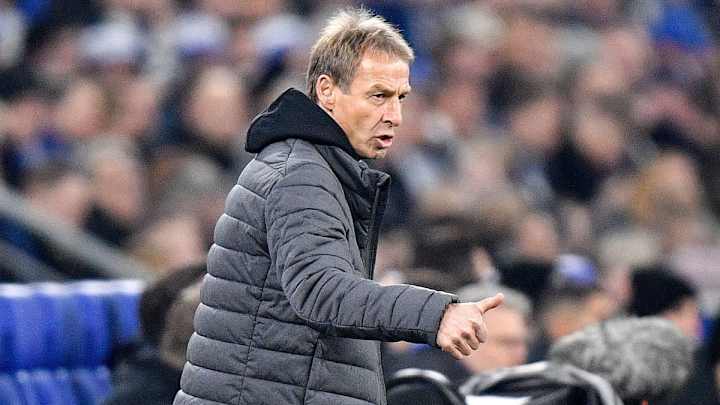Jurgen Klinsmann Defends Hertha Berlin Resignation, Cites Power Struggle

BERLIN (AP) – Jurgen Klinsmann has defended his abrupt resignation as Hertha Berlin coach and suggested that cultural differences and a power struggle were behind his decision to quit after just nine Bundesliga games.
The former Germany and United States coach addressed fans in a live broadcast on Facebook on Wednesday, when he apologized for the manner of his announcement the day before - also on Facebook - and suggested he had misjudged the situation he was getting into when he accepted the job on Nov. 27.
''Conditions were very difficult for me, perhaps because I've had other experiences in other countries. I've experienced life in Italy and France and England, of course,'' Klinsmann said, referring to his playing career.
Klinsmann said he regretted that he hadn't been given full control over the squad and that he clashed on several occasions with general manager Michael Preetz, whose duties he felt should be his own.
''In Germany we're used to having a manager on the substitutes bench at the side of the pitch and that he participates, that he's there for the players, and keeps the door open for them. I wasn't used to that anymore. I know the English model for a manager - they're called managers in England, not coaches - has only one job and that's being the boss of the club,'' Klinsmann said.
''They're different in Germany, where everyone gets to have their say, everyone plays a role, the whole management structure. In the end only one can decide, and I feel it has to be the coach. And we disagreed there. Unfortunately we disagreed on many things.''
The turning point came after Hertha's meek 3-1 loss at home to Mainz on Saturday, which came four days after its extra-time defeat to Schalke in the German Cup.
''I hardly slept at all that night and then I came marching in early yesterday morning, and I'm a type of person that can hardly be stopped. Sure, if I had spoken to a couple of people, they probably would have convinced me to keep going, to take two or three days off or whatever. I didn't have the day off that the team had and that's how it happened,'' Klinsmann said.
Klinsmann's decision to quit caught Hertha by surprise, with the players and Preetz only finding out shortly before he made the announcement on Facebook.
Much was expected of Klinsmann when he was appointed, and an extensive backroom staff was hired to help him deliver on the promise provided by a $250 million investment from new backer Lars Windhorst.
Klinsmann was supposed to lead Hertha up the standings toward the European qualification places. But the team is still fighting off relegation.
''A lot of you said it ended in chaos,'' Klinsmann told fans. ''That's absolutely not true, absolutely not true. This team is stabilized. We came in and the team was practically in a relegation place, level on points, and now there's six points difference. The team is stabilized and playing in whole different way to the way we found it.''
Hertha's record under Klinsmann in the Bundesliga is three wins, three draws and three defeats. The 55-year-old said he was sure the team will stay up, regardless of who is coach. Assistant coach Alexander Nouri is in charge for now.
''The goal for the year is survival, next year the goal is towards Europe,'' Klinsmann said. ''The goals are very important. If you don't have goals, there's no point in getting out of bed in the morning.''
Preetz, Windhorst and Hertha club president Werner Gegenbauer - who rarely makes public statements - are to hold a joint press conference to address the issues on Thursday.
